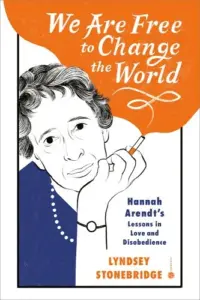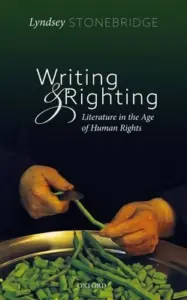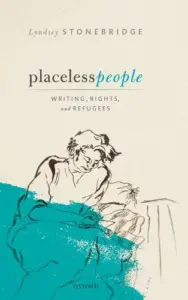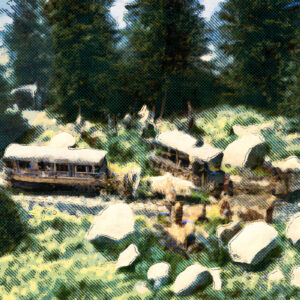Lyndsey Stonebridge and Lucas Johnson
On Love, Politics, and Violence (Channeling Hannah Arendt)
Here is a stunning sentence for you, written by Lyndsey Stonebridge, our guest this hour, channeling the 20th-century political thinker and journalist Hannah Arendt: “Loneliness is the bully that coerces us into giving up on democracy.” This conversation is a kind of guide to generative shared deliberations we might be having with each other and ourselves in this intensely fraught global political moment: on the human underlay that gives democracy its vigor or threatens to undo it; on the difference between facts and truth — and on the difference between violence and power. Krista interviewed Lyndsey once before, in 2017, after Hannah Arendt’s classic work, The Origins of Totalitarianism, had become a belated runaway bestseller. Now Lyndsey has published her own wonderful book offering her and Arendt’s full prescient wisdom for this time. What emerges is elevating and exhilaratingly thoughtful — while also brimming with helpful, practicable words and ideas. We have, in Lyndsey’s phrase, “un-homed” ourselves. And yet we are always defined by our capacity to give birth to something new — and so to partake again and again in the deepest meaning of freedom.
Hannah Arendt’s other epic books include The Human Condition, and Eichmann in Jerusalem, in which she famously coined the phrase “the banality of evil.” She was born a German Jew in 1906, fled Nazi Germany and spent many years as a stateless person, and died an American citizen in 1975. This conversation with Lyndsey Stonebridge happened in January 2024, as part of a gathering of visionaries, activists, and creatives across many fields. Krista interviewed her alongside Lucas Johnson, a former leader of the International Fellowship of Reconciliation who now leads our social healing initiatives at The On Being Project.
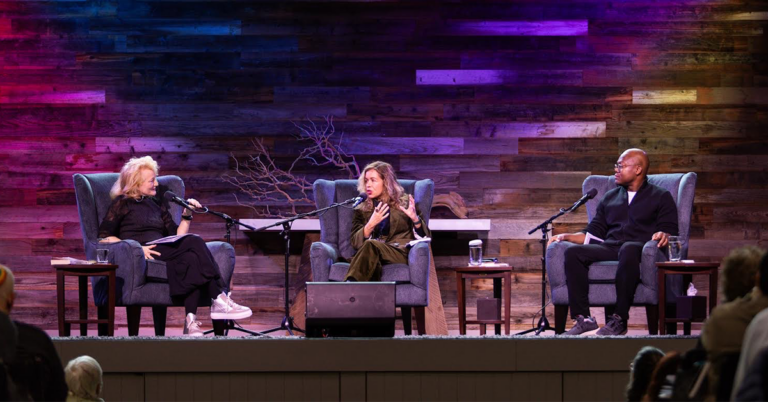
Image by Bethany Birnie, © All Rights Reserved.
Guests
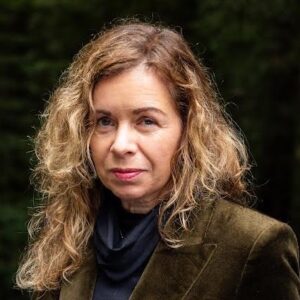
Lyndsey Stonebridge is a Professor of Humanities and Human Rights at the University of Birmingham in the U.K. Her 2024 book is We Are Free to Change the World: Hannah Arendt’s Lessons in Love and Disobedience. Her other books include Placeless People: Writings, Rights, and Refugees. In 2023, she was elected a Fellow of the British Academy.
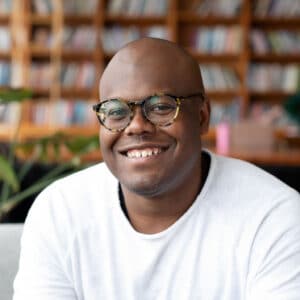
Lucas Johnson is Executive Vice President of Public Life & Social Healing at The On Being Project. He was previously a leader of the International Fellowship of Reconciliation, the world’s oldest interfaith peace organization. Read his full bio here.
Transcript
Transcription by Alletta Cooper
Krista Tippett: Here is a stunning sentence for you, written by Lyndsey Stonebridge, my guest this hour, channeling the 20th-century political thinker and journalist Hannah Arendt: “Loneliness is the bully that coerces us into giving up on democracy.” I interviewed Lyndsey once before, in 2017, after Hannah Arendt’s classic work, The Origins of Totalitarianism, had become a belated runaway bestseller. Now Lyndsey has published her own wonderful book offering her own and Arendt’s full prescient wisdom for this time. What emerges is elevating and exhilaratingly thoughtful — while also brimming with helpful, practicable words and ideas. It is a kind of guide to generative deliberations we might be having with each other and ourselves in this intensely fraught global political moment. In fact, I encourage you to listen to this show alongside someone else, and in friendship to metabolize its gifts of perspective: on the human underlay that gives democracy its vigor or threatens to undo it; on the difference between facts and truth — on the difference between violence and power. On the way we have, in Lyndsey’s phrase, “un-homed” ourselves. And yet how we are always defined by our capacity to give birth to something new — and so to partake again and again in the deepest meaning of freedom.
I’m Krista Tippett, and this is On Being.
[music: “Seven League Boots” by Zoë Keating]
Hannah Arendt’s other epic books include The Human Condition, and Eichmann in Jerusalem, in which she famously coined the phrase “the banality of evil.” Arendt was born a German Jew in 1906, fled Nazi Germany and spent many years as a stateless person, and died an American citizen in 1975. This conversation with Lyndsey Stonebridge happened in January, 2024 as part of a gathering of visionaries, activists and creatives across many fields. And I interviewed Lyndsey alongside my colleague and friend Lucas Johnson, who is a former leader of the International Fellowship of Reconciliation and now leads our social healing initiatives at the On Being Project. You’re going to hear a mention of a moving poem we had all just heard in that room, called “Joy is the Justice (We Give Ourselves),” read by ornithologist and poet and former On Being guest Drew Lanham. We’re going to be putting that in the feed for you to hear too, by the way.
[music: “Seven League Boots” by Zoë Keating]
Tippett: So, Lucas is up here with me. Lucas and I talk a lot. Lucas and I are very different people in so many ways, but we have these weird things in common, like we both speak German, and we both read Hannah Arendt. We’ve never done a conversation together. So it’s going to be improvisational, and let’s just hope it feels like jazz. We’ll see. But Lucas, I just want to invite you to throw in why this conversation is interesting and important to you, from your — from who you are.
Lucas Johnson: Well, so in my life as someone who has — I mean, some of you know that I was mentored by veterans of the Civil Rights Movement, and I’ve spent a good amount of my life trying to deal seriously with questions of violence —
I’m sorry, I’m still recovering from Drew. I was so moved.
For me, sort of trying to deal earnestly with the problem of violence in our world, encountering Hannah Arendt was sort of unavoidable, and her reflections kind of demanded to be taken seriously for me, even when I felt she was wrong. And so I think we’ll talk a little bit about some of that today.
Tippett: Okay. And Lyndsey, you write about how — first of all, welcome, and thank you for traveling so far. The book is out later this month, right?
Lyndsey Stonebridge: Tuesday.
Tippett: Tuesday. I finished reading it on the last day of 2023, and I got to the end, and I saw that you mentioned your conversation on On Being, and it literally made my year. [laughter] It’s like okay — that it flowed into the writing of this book. You talk about how Hannah Arendt said, “You think your own thoughts but in [the] place of somebody else.” And I’m not sure what that means. I think that has connected to how we’re going to ask you to channel her, but tell me what that means.
Stonebridge: Yeah. I just want to say I don’t just mention Krista in passing. [laughs] The On Being Project and Krista are at the beginning of my acknowledgements because I would not have written this book in the way I ended up writing it without this love of the world that you’ve created. So thank you. [applause] And just another one; then I’ll get to the question. As I was listening to Drew — and I told you to read The Human Condition. I’ve read that book a lot, and each time I read it, I think, “I’ve never read this book before. I don’t know what it’s about.” But when I read it this time, she mentions the word joy 27 times.
Tippett: Ah!
Stonebridge: So I was hearing that as I was listening to Drew, which is not kind of the thing you think about when you think of Hannah…
Tippett: No.
Stonebridge: …Arendt. Joy.
Tippett: Yeah, yeah.
Stonebridge: But we should. Hannah Arendt says the world is suffused with thinking, being. That’s happening all the time. Thinking, thinking, thinking. Non-instrumental thinking and love. Love and thinking are very closely connected. And it’s quite difficult to get your head around that in universities or in the context in which we’re supposed to professionally think.
Thinking in terms of others was both — I mean, it is one of her touchstones, and she’s very strict. She quite — I don’t mean empathy. I don’t want you to empathize, she says because she’s quite hard-nosed. All she actually means is, I want you to think what the world looks like from the perspective of another. So that you’re not necessarily gathering them into your world. You’re actually imagining what the world looks like from their perspective. It’s an endeavor which sometimes she’s very successful at, and sometimes she fails.
And I found myself having her voice in my head far too much and constantly trying to imagine what the world looked like at that point from her perspective. I also got into some quite cross conversations with her in that process.
Tippett: And when she’s in your head, are you also metaphorically smoking a cigarette with her?
Stonebridge: Oh, I wish.
[laughter]
Tippett: I want to read a couple of things that you wrote, and they kind of complement, oppose and complement each other, and also speak to how she speaks to us. “A cynical disenchantment with politics characterizes our time as it did Arendt’s, as does an inchoate hate ready to be directed at anything and anyone. Conspiracy theories flourish. Self-censorship is back. Many of us are lonely. We have now added the reality of the climate apocalypse to the threat,” which was the threat of her time, “of total nuclear apocalypse. The tacit acceptance that there are certain categories of people — refugees, migrants, the uprooted, the occupied, the incarcerated, the permanently poor — whose lives are essentially superfluous has not changed much since the Second World War.”
You also wrote, “She loved the human condition for what it was: terrible, beautiful, perplexing, amazing, and above all, exquisitely precious. And she never stopped believing in a politics that might be true to that condition.” I want to talk about… And I think it’s really important that we talk about what we’re talking about when we talk about thinking. Something she wrote that just echoes so much of what we’ve been speaking about the last few days, and she said, “In the modern age, thinking became the handmaiden of doing.” She’s not talking about a life of the mind as a mind of mastery.
Stonebridge: Yeah.
Tippett: Thinking is our human birthright, and we do it for ourselves and for and with one another, and thinking has moral consequences. So I’m going to stop talking, and let you talk, [laughs] but I love just really drawing this out.
Stonebridge: Yeah. Her definition of thinking is that two-in-one conversation that we have in our heads all the time. And you’re quite right. I mean, she distrusted academic and philosophical thinking. That came directly out of her experience of Germany under the Nazis. People who said they were clever made really bad decisions and then pretended they hadn’t. And they were the clever guys. And she’d say again and again: I don’t want anything to do with specialists or intellectuals. And she could be a bit high European snobby, but she actually really meant that, and she didn’t take a university post until the end of her life. She didn’t want anything to do with it. And there was a sense of if — she was an existentialist, so if we’re not grounded in anything, what is it that grounds us? Thinking.
And as a young girl, and I say girl, she’s like 15. She read Kant because that’s what you did in Konigsberg. [laughs] And she took a really simple lesson from Kant. One is that we think, and how we think has moral consequences for other people. And she says it takes real courage to live in that world, if that’s what there is, if it’s just thinking. And then we have to make that moral decisions based on — It’s us who are granting each other, dignity is made between people. It’s not a gift. It’s something we make together. And that’s all there is. So what is thinking? It’s that two-in-one conversation we have all the time. Or thinking is also where — she says at one point: It’s why thinking is a bit like love. Thinking is what happens when something is absent. You don’t need to think of things that are right in front of you. And love is that gap between us and others, and you can bring those in with thinking.
Tippett: Start talking to us about how, because of this conversation that you’ve been in with her, how this influences the conversation you have with our world now in terms of — I feel like we’re doing something a little bit weird here because I really think in most spaces in our life together now, to say we need to think differently, that would feel like a conversation we don’t have time to have. It’s not urgent enough. You’re talking about this interior dialogue with yourself and then the world, and this idea that if you can’t have that inner dialogue, then you can’t speak and act with others.
Stonebridge: Yeah. That goes back to — she said many things about loneliness, but one of the really interesting things she said was the thing she really feared is modern loneliness isn’t just being lonely; it’s crushing. She talks about under totalitarianism, totalitarian societies are gripped with an iron ring, and she says: Loneliness is like that. No one dares speak. No one dares have a thought. No one dares trust anyone else. So loneliness is — you know, it never leaves you alone, paradoxically. It’s menacing. It’s coercive. It’s horrible. And she said the worst thing is that the culture of loneliness will get rid of space for solitude, where I can discover myself from what I think.
Tippett: And solitude is a different thing from loneliness.
Stonebridge: Solitude is a different thing from loneliness, because the worst thing you want is not to be able to be alone when you want to be, because you want to think, and you want to work out your relationship to the world, and you don’t want to have other people’s voices in your head. You don’t want to be told what you should be thinking. You want to test things out alone. She says it’s where you discover yourself in relation to other people, is in solitude.
Tippett: Right. And it’s that paradox, right? Also, this idea that when we are — I think we think about thinking being about truth, also articulating truth, and that is not the same thing as facts. Facts alone have never been able to convey the totality of truth. She said, “Conceptually, we may call truth what we cannot change. Metaphorically, it is the ground on which we stand and the sky that stretches above us.” But I think in this culture, we have absolutely conflated facts with truth, and we have competing facts, and this utterly divides us. But she said — and this was just such an insight — that living with different facts, knowing that I do not possess the same facts as you, is itself separating and lonely.
Stonebridge: Yeah. Well, that goes back to why loneliness is a threat not only to health and happiness and potential, but to democracy, because if you don’t inhabit the same commonsensical world — when she talks about common sense, she’s talking about not the kind of world where we think, “Does that seem right to you?” Do we have a commonsense of what there is? There’s always going to be difference in antagonism within that. But it also goes very deep, common sense is like, who is seen in this common sense world? What is your sensuality of that world? What’s visible? What’s invisible? What does it taste like? What does it feel like?
If you’re not with other people, if you’re lonely, there’s no one to test that with. We can’t inhabit the same space. At that point, you do become detached from the truth of existence, and at that point it’s really dangerous because you are just in competing truth and fact land. Because you’re alone, and conspiracy theories and other big narratives sometimes get very, very appealing, because they have a coherence or a logic that is lacking.
She says at one point, people aren’t stupid, there’s a real mistake to think that people who are drawn to conspiracy theories are stupid. They’re actually embracing a fictional world in protest against the world they have to live in. So she’s cynical, not stupid. [laughs] But that sentence roars up to me from the ’50s to now.
[music: “Arrival at Kirkenes” by Blue Dot Sessions]
Johnson: You know, one of the things that I think about, part of what we’re talking about here that I really appreciate about her is she’s someone who is so deeply engaged in all of the conversations that are happening. In some ways, I’m glad that she never became an academic because she would have been confined and siloed in certain ways at the time, and she’s so — one of the things that she’s reflecting about, that I’m always drawn to, is the student movements of the ’60s. Not just in the United States, but globally.
I think about reading her in On Violence, I think about how she’s very concerned about what’s happening, but I’m also thinking about how analogous her words are to this kind of intergenerational moment of today. So she says, and I think everyone will recognize the parallels to this moment that we’re currently in, she writes, “It’s only natural that the new generation should live with greater awareness of the possibility of doomsday than those ‘over thirty,’ not because they are younger but because this was their first decisive experience of the world.”
Then later she says, “To the often-heard question, Who are they, this new generation? one is tempted to answer, Those who hear the ticking. [And] to the other question, who are they who utterly deny them? the answer may well be, Those who do not know, or who refuse to face, things as they really are.”
I’m thinking about that moment in which she was reflecting and engaging, and the way that it played itself out on generational lines, and I’m thinking about the present moment. I’m wondering, are there any reflections that you think would be particularly poignant for that generational dynamic, that you would offer?
Stonebridge: Though she didn’t have an active position, she was a teacher and she loved her students. I’ve interviewed quite a few of them, and she called them — it goes back to her importance of new beginnings in her work and natality, each time you have a new generation you have a new beginning, you have a new start. The job of older people is to make way, make the spaces in which that can flourish, in which people can act. And step back, shut up.
But she also used to say, and I love this, after the student movements were really taking off, she was always saying: I always tell my students to have fun, have as much fun as you possibly can. What she meant was — she thought that not being able to participate politically, not to be owning or seen in a political space was existentially damaging because you were only operating part of yourself. So what she took from the example of revolutions and action was a sense of human completeness comes with acting in concert with others in the world, so it’s supposed to be fun. It’s supposed to make you happy, there’s a joyousness to this.
So I do think that quote, when I reread On Violence this summer: They are the generation who hear the ticking — we didn’t listen to that generation, we didn’t listen to them in the right way. Now the ticking, it’s really loud. [laughs] It’s not even ticking anymore, it’s yelling in our faces. And I do think that question of what it means to not have a future, to know that you don’t have a future — actually the climate catastrophe, existentially we haven’t even began to get our head around what that means — is I think affecting the activism we’re seeing now.
Tippett: Free speech is such a lightning rod for us, and it’s so polarizing. There’s clearly something so wrong with the way we’re doing it, because it’s just tying us up in knots. But I thought it was interesting in contrast to that, what she talks about is freedom of mind. You wrote, “Having a free mind in Arendt’s sense means turning away from dogma, political certainties, theoretical comfort zones…and satisfying ideologies. It means learning instead to cultivate the art of staying true to [the] hazards, vulnerabilities, mysteries and perplexities of reality, because ultimately that is our best chance of remaining human.” Can you say some more about that?
Stonebridge: I hadn’t realized how — because she does very quietly — how against mastery she was. So thinking that I have an opinion, I’m going to spread it. There’s already a lot already going on there. [laughs] So how did you get your opinion? Is your opinion the same as you? What are you trying to master through this opinion? She hated the kind of thinking that thought you could make the world through thought, that was lethal for her. The kind of thinking and cultivation she wanted begins with that complex reality, it’s always responsive. She wanted a responsive politics and responsive thinking. That’s why she was so anti-ideology, as she saw it, because the thinking had been done already.
But coupled with that, and I think going back to The Human Condition which I just think is the book of our time, even much more than it was in 2016, is along with the word “joy,” the other word in that book is “frailty.” It goes back and back to the frailty of the human condition, the frailty of people, the frailty of politics, the frailty of critical institutions. She’s not doing it to say, “So toughen up.” She’s doing it, “What if we started with the frailty?”
Tippett: There’s a line you said, you said, “We talk a lot … about strengthening democracy … but what if we recognized the frailty of human affairs as the condition of politics to begin with? What if we reckoned with human vulnerability as a starting point and not as some political afterthought?”
Stonebridge: I think that’s so where she got to in The Human Condition is, the aching frailty, that’s where we need to begin. Because otherwise, you’re constantly trying to master it, and we can see where this goes.
Tippett: And that is so counter-cultural, that is so un-intuitive in this world, and especially the way we inhabit our public spaces.
Johnson: Well, it’s also the way — she’s constantly trying to pull, expand the conceptual frameworks that people are thinking and acting within, and trying to get us to think differently about the language we think we know and the way that we think we understand things to be operating. I find that particularly to be true with respect to power — you know the language — how we understand power and how we conceive of violence, particularly in relationship to the state.
She says this line, “Violence can destroy power; it is utterly incapable of creating it.” There’s another point where she talks about, “All political institutions are manifestations and materialization of power; they petrify and decay as soon as the living power of people ceases to uphold them.” So there’s a question about legitimacy and how we think of power and how we understand violence, and where power derives, and what relationship violence has to do with power. Could you say more about that?
Stonebridge: Her distinction between power and violence and her refusal to say they’re the same thing I think is so important. I wrote the introduction to the new edition of On Violence this summer, and I live in France a lot, and as I was writing background to that was the shooting of a boy called Nahel Merzouk in Paris, It was an execution by the French Police, and France just erupted at that point. As well as it being a demonstration of power and violence coming together like this, the scariest moment was when the French Police Union sent out this letter, which is a warning to Macron and it was a warning to the Arab communities of France that said: we are coming for you, you are scum. And this was the police, as she says, sounding surprised. [laughs]
That conflation, that kind of, “Okay, we’re going to — because we don’t think we’ve got power — we’re going to use violence, and we’re telling you we’re going to do that.” And Arendt’s distinction is like where she says: Violence can topple power, but it will never endure. The only true political power comes from assent and consent between people. That is power. That’s all there is, it’s kind of a magic trick, behind the curtain is us consenting or dissenting, and political power only lasts, true political power only lasts as long as people are acting in concert to consent to that power.
Which is why civil disobedience was so important to her, and why she thought it was such an important part of American life. America would not survive, she thought, without recognizing the importance of civil disobedience, because it’s about consent and dissent. Violence is just, she wouldn’t even concede it was power, it was just violence. She says at the end of On Violence: Yeah, sure you can change the world through violence, but the likelihood is you’ll change it to an even more violent world.
Johnson: So this reminds me, so — the first time Krista and I were in conversation was with an elder, a mentor of mine, Gwendolyn Zoharah Simmons, and in 2016 I think it was … So in 2015 Michael Brown was killed here in the United States, or 2014, was it? In 2015 the Charlie Hebdo attacks happened in Paris. And one of the things that we saw in Paris were again police brutalization of Brown communities, which was happening in Paris and also in Brussels. I brought some folks that I had met in Ferguson, in the Ferguson rebellion, to Europe to exchange about their experiences dealing with police violence. I also brought Zoharah Simmons. And I remember…
Tippett: She was a civil rights elder really involved in the Mississippi Freedom Summer when she was 15 or something.
Johnson: …she’s a veteran of SNCC, of SNCC organizing, and a remarkable person. And part of the reason why I’m telling all of this is because I feel like Arendt has some … In these reflections on power and these questions of legitimacy, there are tools for us to think about how we organize. I remember being in Brussels and a young man stood up and he was challenging Dr. Simmons, and he was challenging the notions of nonviolence, and the fact that they failed to prevent the problems that we were confronting today.
Dr. Simmons said two things that I’ll never forget, she said, one, You have to deal seriously with the mechanisms of the state that were arranged against us. All the weaponry of the U.S. arsenal were on the streets in Mississippi and in Georgia and in Alabama, in Arkansas, faced against us. And when you love the people you’re organizing, you don’t want to see them hurt. I think about that and I think about her wisdom in responding to that moment, and I think about her awareness of true power, and I’m wondering if that sparks something in you in terms of how Arendt would — the irony is that I think Arendt got this wrong in terms of some of the student protests of the ’60s, and the Civil Rights. She was actually wrong at that point, but I wonder if you could apply the wisdom in a way that she would in hindsight now?
Stonebridge: I don’t think I can do that as well as you could. [laughter] I mean that, I’m not being facetious. I mean, she said — On Violence was an essay she wrote three times actually, she started it in ’67 and it wasn’t published until 1970. The beginning of, when America was getting very violent, I mean it’s always been violent, but when other people, other Americans started to notice it was violent, she had a much softer line. She’d actually say, “Sometimes you need violence.”
What she hated was the narcissism and aggrandization of violence or the sense that there wasn’t an alternative to violence. She was suspicious of violence. And I think this talks to the moment now, is that people do not feel that democracy is their democracy. There is nowhere to participate. I do think that social media has made that worse, I do think the outrage industrial complex has given the illusion that you’re harnessing outrage and really proper justice things, but not actually giving us the tools or the spaces to fully participate.
On the one side, you have at the moment, and I think that’s why I am quite hopeful, young people are organizing, they’re creating their own spaces, there is activism, there is a taking back of power, in Arendt-ian sense, consent and dissent. On the other side, when people can’t participate, can’t be part of the communities, then you do have a recipe for versions of fascism, versions of populism, versions of organized hate.
[music: “Eventide” by Sanctus Music]
Tippett: A quick reminder that this conversation channeling Hannah Arendt — with Lyndsey Stonebridge and Lucas Johnson — unfolded in a room full of visionaries, activists, and creatives across a spectrum of fields — and I know you’re hearing references to other conversations and ideas that were floating around across that three day gathering. Rest assured, we’ll be offering more of that up as this On Being podcast season continues.
Tippett: I keep thinking of some of the journalists who are in this room, and I think Amanda Ripley, I don’t know, maybe, where are you, Amanda? Talking about what we need is a — What is it? “Fear and loneliness beat” in journalism. And Lyndsey, something you said, “The political storytellers we need the most right now” — I would say journalistic storytellers — “are those who are most skilled at persuading us to share a world of facts.” That deeper thing than offering the facts that you do.
I want to talk about natality, I want to shift, I want to also say — Lucas and I were aware as we walked into this, this is raising a lot of really serious hard things, and we’ll come back and let those into the room. So whatever this is raising for you, after our break. Natality is such a beautiful thing she talked about, and it’s an antidote to this, or it’s something that we’re invited to hold right alongside. So I hear that language, I hear people picking up this concept, attributing Arendt and not attributing Arendt, and I think that’s interesting when that happens. This true thing was spoken and now it’s finding its time.
Stonebridge: I hate to bring up the H-word, but it comes from when she was working with Heidegger—
Tippett: I was like, “What is the H-word?” [laughter]
Stonebridge: The H-word.
Tippett: That’s not an obvious allusion. [laughter]
Stonebridge: No. And he wanted, if there’s only being — existentialism always has its Wile E. Coyote moment, we look around and we’re peddling on air. And our back paws going furiously, going, “Ah.”
Existentialism, say, “Yeah, that’s really scary. But at that moment you could see the top of the trees, and the snow, and the beauty.” So at that moment where the ground has given way, you can see the beauty of the world. Arendt never lost that. Heidegger says: Yes. And the other thing you need to know is you’re going to die. You’re now “being towards death.”
Tippett: OK, Heidegger is a philosopher, was also her lover…
Stonebridge: Yeah, and a Nazi.
Tippett: …her teacher. Later a Nazi, very complicated, human condition, the drama of the human condition writ large.
Stonebridge: Yeah, yeah. But then, she wrote her dissertation on our Augustine. I kind of think, and I think of your —
Tippett: Yes. It’s so interesting to me that she wrote about St. Augustine and love.
Stonebridge: Yeah. And she was in her early twenties, and she was just sitting there, going, “I’m writing my dissertation on Augustine.” And I’m going to smash Augustine and Heidegger by talking about love in a way that Augustine meant, but didn’t —. He did mean, but I’m going to bring out the nice spiky, exciting. And I’m going to tell Martin Heidegger, that it’s not about death, it’s about love. And it’s about love, because love is new beginning. It’s about natality. And the ability, each time someone comes into the world, something new happens, and something new can happen. We can begin again. We keep on beginning, again. And I think that sense, in The Human Condition is a book of lots of distinctions. And she uses the word “distinction” like 117 times.
Tippett: I love how you know many times she used all these words. [laughs]
Stonebridge: I know, because I was in lockdown and I didn’t have anything else to do but count words [laughter] and make pipe dreams out of the human condition.
And usually when philosophers are making distinctions, you think, oh God, they’re exclusionary, making that distinction to push that thing out, they’re making. And she’s really not, that’s why she had to use it 117 times.
And she talks about, one of the distinction she makes is between labor, work, and action. And labor, then she talks about labor, she’s talking about the life process. Labor is what we all have to do to sustain life. We have to eat, we have to cook, we have to raise children, we have to care for our elderly.
These things don’t produce anything. They keep on — it’s the cycle of life.
And what she says happens is work and labor became conflated. So now we can’t tell the difference between work and labor anymore. And in capitalist consumer culture, it was literally work was becoming labor, labor into consume. So you weren’t working to keep anything human —
Tippett: To be alive.
Stonebridge: In the human world. Yeah. Yeah, it was just a function. And in that, I think, she also linked this to the growing environmental movement. And she said that towards the end of her life, one of the last things she said, is the growing environmental movement is the first attack on growth for growth’s sake, that might yield something politically hopeful in the future.
So one of the tragedies of her dying so young was she didn’t get to participate in that moment. There’s another thing I say in the book, and I hadn’t realized this until I’d looked either, that in The New Yorker, between ’62 and ’63, the autumn of ’62 and the spring of ’63, three essays were published. One was Rachel Carson’s Silent Spring. Then that was followed by James Baldwin, The Fire Next Time. Then Hannah Arendt on the Eichmann Trial. Within six months. And with laying out with visionary precision, the poisonous master plots of contemporary life: violent racism, planet catastrophe, banality of evil, right in front of us.
And there’s a reason why Baldwin, and Carson, and Arendt, I think, are friendly ghosts — well, maybe not friendly, they might be really quite agreeing but cross, up to present, is that they laid it out. And all of them were talking about the same thing in a way, which was what Baldwin called the constants, the things that are under your nose, the things that already exist.
So it’s not changing the world to make a brand new world. It’s changing the world so that the things that are already there can be. And they were all making that point in very different ways. But it wasn’t about big projects, it was about, look under your nose. It’s there.
And when Arendt talked about the banality of evil, by which she meant the thoughtlessness with which we condemn people to lives of misery, and death, and violence. And she compares the banality —- Why she wants to talk about the banality of evils is she did not think it ended with the Holocaust. It leaked into the culture, and it was now there to stay.
And she said it spreads like fungus. And what about, and this is a conversation I’ve had with Paul Gilroy a couple of times, what about banality of the good? What would that…
Tippett: I love that.
Stonebridge: …what might that look like?
Tippett: You mentioned Baldwin, and they had such an interesting correspondence also. And also, I do want to come back to this idea of love, which is connected to natality. You said, to what she was talking about, it’s the love that says, “I want you to be.” And you said, she learned about love, in part in a concentration camp, that sometimes love is not all you need, but all you’ve got. And that, “Love matters to our politics because it matters to us at the most intimate level of our lives.”
And one thing I think about a lot, as I think about our polarization, and how we have trouble sharing life, really, because I think she’s talking about politics as shared life. And so often when we talk about politics, we’re talking about who you voted for. And that really diminishes us. Lovers don’t always share the same facts. It’s not true in our most intimate relationships that we feel understood, or understand, and yet we choose to stay in relationship.
Stonebridge: In some ways, she tried to guard love. And this is where her distinction, she didn’t want a politics based on love, because she thought it could become an abstraction.
Tippett: Right. Yeah.
Stonebridge: And she kind of thought, and this does come out of her experience of Nazi totalitarianism, is like, I do not want populist emotions governing politics.
Tippett: Even love.
Stonebridge: Even love. Yeah. I’m not sure about that. What I learned while writing this book is, one of the difficult conversations I had with Arendt was about love. I think she does want to guard it. And in some ways, I think I get that. Because what politics does, when politics enters into your private life, when it gets in the bedroom, and it gets in your head, and it’s telling you who to love and how to love, that’s not what we’re interested in.
But I think it also goes back to some of the things, Lucas, you were saying about learning about her work on violence. The way we have imagined politics, which I don’t think is the way we need to do forever and ever, is to think about, politics came about because what wasn’t politics? And the classic one the West likes to think about, is we did politics instead of war. So in the origin stories of politics, it’s like Troy and Rome. And at some point, instead of beating each other up, and being men in war, we decided to beat ourselves up through politics, and be men in politics. And that was much better than ripping each other to bits. And so you often get the politics instead of violence. And she kind of buys that for a lot of the time. And you often hear that, when Clausewitz says, “War is politics by other means.”
But there are other things that are outside politics that make politics possible. Thinking is one and love is another. And I was thinking, well, what happens if you say, “Love is politics by other means”? And you think, well, I don’t really want that, because that doesn’t sound too nice. But what if you said, “Politics is love by other means”? What if we don’t buy that we only have politics because we think it’s better than war?
And what would that — It’s not a question Arendt would let herself ask, and I think for good historical reasons. It’s a question we can learn more from Baldwin about, I think.
Tippett: I stumbled — the other day, I decided to take this as a sign. I was in the middle of this, and then I saw this quote from Maria Popova’s Marginalian. Maria is supposed to be here, and she’s one of the people out there who’s very sad that she’s not. — “The longer I live, the more deeply I learn that love — whether we call it friendship, or family, or romance — is the work of mirroring and magnifying each other’s light. Gentle work. Steadfast work. Life-saving work in those moments when life and shame and sorrow occlude our own light from our view, but there is still a clear-eyed loving person to beam it back. In our best moments, we are that person for another.” I think that echoes so much of what we’ve been hearing and talking about.
Johnson: I’m curious, Lyndsey, can you — Because part of what Krista — Because, Krista, you’re so rooted in these questions of the human condition, right? And what’s happening inside of us as we’re engaging these questions. And I’m trying to bring in Arendt’s reflections from the perspective of what we do collectively. And so I’m thinking about the bridge between what Krista just offered on love, and what it means for legitimacy when it comes to the institutions we create. And we’re in this moment where all of the assumptions, which Arendt also contended with, all of the assumptions that we’ve structured our post-World War II world with are kind of crumbling at our feet. Is that because of… Clearly, part of that is a lack of legitimacy. And it has something to do with what I think Arendt would describe as a misunderstanding of power. How does that relate to love for her?
Stonebridge: I think that she was going to call The Human Condition, The Love of the World. And I kind of wish she had. And I think that goes back to her sense of — she starts The Human Condition, and she describes watching the first satellite ever going around the earth. And she was in New York, and she was trying to see if she could see it. And she was saying, everyone’s really sad. And one of the reasons people were sad is because it was a Soviet satellite, not a U.S. satellite.
Tippett: Right. [laughter]
Stonebridge: So this was the age where, talk about failing post-World War II institutions, this was a Space Race, and science, and tech, and yay. And she was saying, “Why do we want to…” She said, “The sadness is about wanting to leave the world.”
There’s a kind of relief that we can leave the world, and that’s terrible, for her. So I think going back to your question is, we are homeless. That’s why the connection between statelessness and refugees is so poignant, because refugees aren’t just something that’s unfortunately had to other people.
She later says: we are all stateless, in terms of we have un-homed ourselves from the human condition. We have un-homed ourselves from our world. So I think the challenge is to find new homes, without smashing up the old ones. Because there are a lot of homes that are perfectly good. I was thinking about the observation made last night, that a lot of kids are looking for spiritual comfort, or help, or conversations with university chaplains, but they’re not religious. And I was thinking, how much displacement and uprootedness has uprooted people from religious institutions…
Tippett: Yes.
Stonebridge: …that then need to be remade.
Tippett: Yes.
Stonebridge: I know this from my own family. My grandmother comes from Derry, and she comes from Brandywell, which is in Bogside, which is the poorest, most persecuted bit of Northern Ireland. Was. And she came to London, she was a migrant, and married Ruben Steinbach, which is Stonebridge. He was second generation Jewish.
And she would never talk. There’s no religion in our family at all. There’s an uncle who spent most of his life in prison, and there’s alcoholism, but there’s not any religion. [laughter] And there’s a story in my family that — Two out of three.
The priests came to have a go at my grandmother for not sending the kids to Catholic school. My grandmother was very hard. She was a cleaner, and also a chain smoker. So maybe my kind of affection for Arendt is sort of hardwired from that. But she was very, very kind. And I spent a lot, I was brought up by her a lot. And she yelled at him, “I don’t want my kids anywhere near you. I don’t want anything to do with that.” And the joke we have, this isn’t true, the priest left the house, fled the house, met the rabbi coming down, he said, “Don’t go there. Lost cause, a lost cause.” [laughter] So I think there’s something, because poverty and violence are so hideous, you tend to associate. The community you fled can sometimes be associated with — You just don’t want to go back. You don’t want to recreate it.
And I think that the levels of displacement and uprootedness have deprived people from different types of home, different types of institution, which is why the reinvention of community and the reinvention of work that people are doing in this room, I think, is so vital. But it’s important that we recognize. Some people don’t want to talk about the past, because they just want to forget it, because it was horrible. So I don’t know if that answers your question at all. I don’t know what we do with institutions, except try and build new homes for them, which I think goes back to your generational point. It means, for those of us who tried to build them, step back and hand over the keys.
Tippett: I think that notion of uprootedness is so helpful, also, in our compassion for ourselves and softening to each other. You know, we are the first generation in the history of our species —in our species, in every culture across time, maybe there are some tiny exceptions, religious identity, and moral formation, and ritual, and text have been inherited, like hometown and skin color. These have been part of identity, and they’ve been given, and it’s been good, bad, and ugly, or neutral. But people also had something to work with and reject. It’s an utterly unnatural situation we find ourselves in spiritually, that we have to reinvent religion, or all the things that religion brought us, that we have to reinvent spiritual identity.
But it’s happening, right? We’re not going back to — But I also think the traditions have a role in learning how to offer up the best of what they have, because I don’t think we can reinvent it, in that way. But just, again, the compassion towards ourselves. How stressful this is, even when for some of us who are standing on pretty solid ground, we get to be so creative, and there’s something thrilling about it. It’s very unnatural. And that that would be an anchor for people, those were also sources of comfort and community, and knowing how to heal and get grounded.
[music: “Otomy” by Blue Dot Sessions]
Tippett: At this point in the conversation, we invited people in the room to reflect out loud – not so much Q and A as applying the ideas on stage to what’s happening in their minds and hearts, and in their corner of the world and their calling. Remember, this was January, 2024 with all that was happening in the world then. Everyone you’ll hear has given their permission for us to broadcast the comments they made. For some context for you, the voices you’ll hear include a poet, a social entrepreneur, a lawyer, a theologian, and you may recognize the first voice coming up — that of psychotherapist Esther Perel.
[music: “Otomy” by Blue Dot Sessions]
Esther Perel: Interestingly, on October 20, or something like that, there was a big conference at the Hannah Arendt Center on friendship and politics, and together with Marisa Franco, we did a whole talk about friendship. It was three days about her work, and her writings, but one of the things that I stayed with, that you spoke about, was her correspondences.
She was a master of the long form. She never tried to capture things in a few words or a few sentences. I think that because of the timing of that conference, it was just so important for me to remember that, and the importance of friendship and friendship with people she vehemently disagreed with, and how you turn conflict into connection, or how you disagree without disconnecting. All of those things I think are part of her work today, that was not necessarily at the center of her work before. That’s it.
Tippett: Thank you. Yeah. What’s in the room? Yeah, Lucas, you go.
Johnson: That’s something that I think is also particularly important with respect to the relationships she had with Black intellectuals, who — I said earlier that Arendt got some things wrong. Right? Because she was critical of, for example, the — you know, Arendt criticized the choice of the movement in terms of desegregation, in terms of focusing on education, for example, and her correspondence with Ralph Ellison, and with Baldwin, and with others, she was earnestly trying to figure things out. She got things wrong. She could also admit when she was wrong. Right? There was space in those relationships for her to do that. It’s something that’s kind of missing in our public life today. Right? It’s missing in our private lives too.
Tippett: You came all the way from Australia. You get to have a microphone.
Berry Liberman: [Small Giants Academy and Wisdom & Action podcast] So, it’s been a very interesting couple of days to observe the tensions in the rooms, and to observe America. I haven’t been here in a really vital six years. We import a lot of the war that is happening everywhere else in the world. Australia is at the bottom of the world, a lovely island, rather large, and there’s not many of us there.
So we, actually — you were talking about space. People are often afraid to come to Australia, because of the snakes and the spiders, but what they don’t realize when they get there, most people are so moved by the space: the space between people, the capacity for solitude, the thinking. And I’m the grandchild of Holocaust survivors, who came to Australia because it was the furthest away from Europe they could get on the map of the world, which is still true. [laughs]
What they loved when they got there was — many of them commented that antisemitism didn’t exist there, because it hadn’t yet found a pathway for import. Of course, with mobile phones, it’s there nice and healthy now.
I think I’m just noticing when we talk about these struggles or we talk about being able to befriend or even love those who disagree with us, fundamentally, like we really see the world from a different place, and to not protect our hurt places, like I think what Esther was saying, I was talking about yesterday, this feeling of retreat — because the overwhelm of the conflict is now existential, it’s life-threatening.
Not being able to love each other, because our own narrative is screaming in our heads and we’re waiting for the blow, I’m feeling a lot of that while I’m here. The inability to drop into compassion and empathy, because you’re in self-defense and fear. And what I’m aware of, and keep thinking about, is our private lives and our public lives are the same thing.
If we’re able to have — the generative narrative would have courage in it, and I had to get off social media, because it felt like self-harm, and then I thought, “What is the only thing left to me in a world so broken when I am so afraid?” And that was the intimate relational field, the places and spaces where I had cultivated trust over time, because if you’re in a moment of war trying to find, quickly, trust in public spaces, it’s too late. It’s so threadbare, there’s nothing left, and we run from each other internally and actually.
So on October 7, I called everyone I loved, which included everyone on both sides of conflict. All my beloved — and it felt like such a generative response, for me, because I dropped into trust and relationship and love, so — almost no one I know had those long-term relationships on either side, because we don’t know how to find each other.
My breath is taken with the thrill of possibility, and the inspiration of all you amazing people, who are genuinely doing the hard work, but I think we’re not having hard conversations in real time across bridges, and we’re going to need to be bridge builders more and more and more, so as much as I love lovely conversations, I’m longing for the hard ones, that are non-violent, and I don’t even know if I can do that. I’m longing for something I don’t even know if I can do, but it feels like the only way we’ll find each other.
[applause]
Manuel Iris: My name is Manuel. I am a poet from Cincinnati. And against my nature, I’ll try to be brief. [laughter] Well no, by nature, I am pretty brief, I’m just talking of when I talk.
Johnson: Can you stand up?
Iris: Yes. One thing that I believe separates Arendt from other philosophers of her time is that we can read her with a possibility of hope at the end. She’s not focused on death as the main philosophical center of gravity, but nativity and with this, beginnings, all the time, the possibility of beginning is important. And when Krista was talking about how we are in the need of maybe reinventing the spirituality, I think that poetry has showed us since its beginning, which is the beginning of humanity, that we are only inventing new ways to utter what was eternal already.
I do think, like Tolstoy said, I do think that beauty will save the world. Thinking that poetry is only the fuel, or that love is only the fuel, to make the infrastructure is a sore mistake. Love is the brick of that bridge. Art is the iron of that bridge, and it’s not only where we go to rest. It is our tool. It is what we … Half the work is care, but care is love in action. Care is how love looks when it acts through the body of somebody into the body of another somebody.
Then when we talk of loneliness, what is poetry doing, if not reaching out from one solitude to another? What is poetry doing, if not helping us know that we are seen? Borges, that poet, said beautifully that love helps us see other like God sees them. If you stop when the person that hates you is looking at you and stop and say, “How is God looking at this child of his?”
Sometimes I’m a high school teacher, sometimes it is difficult to love my students. [laughter] Okay? For that, I use a prayer of Saint Teresa, it is not Saint Teresa of Calcutta, it’s Saint Teresa of Jesus: It is really difficult for me to love others. I ask you, God, to love them through me.
Sometimes when we talk about feeling seen, as an antidote for solitude, I think that we’re stepping a little short. We are seen. We need to feel loved. My students can feel seen all they want, but they need to know why I love them, because if they don’t feel love, they do not want to learn from me.
I think that there is hope, but there is a lot of work, and the arts are hard work. They are not the place to rest. They are not the squishy part of the day. They are the hard work. They are care. Thank you.
[applause]
Serene Jones: Hi. Thank you. Just amazing conversation this morning. I want to come back to the conversation between Arendt and Baldwin on this question of love, and politics.
I am mindful of this comment that Baldwin made about love and America and politics, and he says: In America, nothing short of love will save us. I don’t mean a romantic or individual love, I mean a fierce political love. He said: We are afraid to take off the masks that we wear, but we’re also afraid to wear them any longer, because they do not fit.
Then he says: Nothing short of grace can save us. And he shifts from that word “love” to the word “grace,” which makes it go cosmic, like this sense that, this affirmation that all of humanity is beloved, and forgiven, sort of this great equalizing moment that’s the foundation of democracy actually functioning.
It was just interesting to think about these different ways that love gets characterized, and where politics ends and begins, and I wonder if you just had any thoughts on that.
Stonebridge: My immediate response to that is to think about what Arendt says about forgiveness. When she said: what do we need to make a political community work? We need two things, promises and forgiveness. I didn’t really understand what she meant about forgiveness until recently. There’s something radically democratic about forgiveness. You can’t forgive yourself, only other people can forgive. Or you can forgive yourself, but politically speaking, forgiveness is an act that comes from plurality.
She gives the example of forgiveness in Christian practice, and the story she tells, was a way of saying, “No, it’s not just one God or one king or one tribe that gets to do the forgiving.” Forgiveness is radically democratic. It has to be a collective who forgive. So forgiveness is something you do when you’re in a community, a community forgives. It’s a kind of de-hierarchization of forgiveness, and I found that so powerful, because it goes back to the idea of frailty. It’s like how are we going to be together? Well, one thing is we set up cultures of forgiveness, which is not the same as saying we’re going to put up with injustice or absolve anything. It is to say we’re in this community together, because we have the capacity to forgive.
And the other thing that comes with that is promises, and she likes the idea of promising, because it’s not about inflicting your will on the world, it’s not like, “I will make the world anew.” “I will will something else into the world.” That’s a nightmare. That’s terrifying.
She talks about promises being a memory of the will. I thought, “What does she mean like that?” I think it’s something about — We’ve talked a lot actually about parenting in the last couple of days as well. When you’re a parent, and you think, “I will will the world not to hurt my child. I will will it. I will make sure. Somehow, I will will that my child will not be hurt,” and you know you can’t do that.
And what we say to our children is, “I promise it will be okay,” and it’s the memory of, going back to vulnerability, “I can’t make the world right, but I can promise I will be here, I can promise it’s a memory of that will.” She said we need those two things, the ability in a political community to make promises, and to keep them, but, also, to hazard — and when we act, when we act, we never know the consequences of our actions. We’re acting so painful, and why all of us are so inhibited about acting, because we don’t know whether we’ve done the right thing or what the consequences of our action will be, which is another reason why we need forgiveness, because it could go wrong.
But we’re never going to risk anything or take action, unless there’s that possibility.
Claudia: Hello. Hello, friends. My name is Claudia. For those of you I haven’t met yet, you’re just a friend I haven’t made yet. Looking forward to it.
I wanted to start off by honoring Berry and her story, and anybody else who has a story that’s similar, I really honor your ancestors. I also am thinking about the fact that Hannah Arendt had very complicated views on Zionism, Israel, and Palestine. And I’m not a scholar of her work at all, so I invite anybody else who knows more to say more, but I think she sort of epitomizes how complicated the feelings are, perhaps even in this room.
In the same way that I wanted to honor Berry, I wanted to think about and invite the over 23,000 Palestinians that have died, and I’ve noticed — I’m going to get emotional — I’ve noticed we haven’t talked about it much, and I know that people have fatigue. People are probably nervous to have debate with people you love. I think that’s normal, but I think if we’re going to invite conversation around Hannah Arendt, then we shouldn’t be scared.
[applause]
I’m going to have to leave it there.
Shabana Basij-Rasikh: Thank you. Krista, thank you for this opportunity to be here. This past few days have been just remarkable. I wanted to comment on a couple of issues that we’re discussing.
One, forgiveness, and also how we look at populations on the move, or sometimes we call them refugees, immigrants, whatever label people associate with people who are — especially people who are forcibly moved.
So, I run a boarding school for Afghan girls. I did this work in Afghanistan until August 2021, and when the Taliban took over, moved my entire school community to Rwanda. It happened at a time when Rwanda was the only country in the world that welcomed us. The more I’ve thought about it, the more I’ve realized that it’s not surprising given the history, the recent history of the country, and when we arrived in Rwanda, our entire community was greeted by trauma counselors and health workers.
The nearly 250 students, faculty, their family members, no one was met at the airport by immigration officers. And when you think about a time that we live in, when in so many places around the world becoming a refugee is one of the worst identities to wear, how compassionately bold to welcome a very hurting community, and not check paperwork. My students who, every day that passes is the longest they have been away from their families — they feel at home in Rwanda.
When we were talking about forgiveness, I find myself so drawn to and inspired by Rwanda and Rwandans who are engaged in a very difficult debate and conversation in-country around peace and reconciliation and forgiveness. And so I encourage all of you to take a look at that. There are a lot of struggle, especially when it comes to educating the young generation of Rwandans on that topic, but it’s a community that understands all of that so deeply.
When we were getting out of Afghanistan, I remember standing at the airport trying to get our community members through over a period of days, and witnessing how intensely the brain of our country was draining. I remember feeling such a deep sorrow in that moment, that the airport was that gateway for Afghanistan losing its potential, its brain, and the minute these people cross over, they’re going to be some of the most unwanted people. I wish that communities welcoming, or not welcoming, refugees from anywhere in the world, not just Afghans, understood that.
Thank you.
[applause]
Johnson: I just wanted to give us space to just sit with — before we finished — to just sit with the weight of all that’s been shared, and just to hold it for a minute before we offer more words.
Tippett: Yeah. We need to finish, and I also want to say there’s a lot more that wants to be spoken and needs to be spoken. It may not all get said in this room, so we’ll take a minute of silence.
[intentional silence]
Johnson: Thank you all.
[applause]
[music: “Eventide” by Gautam Srikishan]
Tippett: Lucas Johnson is Executive Vice President of Public Life & Social Healing at the On Being Project. He was previously a leader of the International Fellowship of Reconciliation, the world’s oldest interfaith peace organization.
Lyndsey Stonebridge is a Professor of Humanities and Human Rights at the University of Birmingham in the UK. Her new book is We Are Free to Change the World: Hannah Arendt’s Lessons in Love and Disobedience. Her other books include Placeless people: Writings, Rights, and Refugees. In 2023, Lyndsey was elected a Fellow of the British Academy.
Special thanks this week to the wonderful 1440 Multiversity team, especially Scott Kriens, Inga Stephenson, Frank Ashmore, Luigi Califano, Manuel Lara, Deric Nadeau, and Amy Natividad, as well as Avery Laurin, with SNA Event Productions.
And our thanks go to the Wayfarer Foundation and the Fetzer Institute, who supported this Gathering.
[music: “Eventide” by Gautam Srikishan]
The On Being Project is: Chris Heagle, Laurén Drommerhausen, Eddie Gonzalez, Lucas Johnson, Zack Rose, Julie Siple, Pádraig Ó Tuama, Gautam Srikishan, Cameron Mussar, Kayla Edwards, Tiffany Champion, Andrea Prevost, and Carla Zanoni.
On Being is an independent nonprofit production of The On Being Project. We are located on Dakota land. Our lovely theme music is provided and composed by Zoë Keating. Our closing music was composed by Gautam Srikishan. And the last voice that you hear singing at the end of our show is Cameron Kinghorn.
Our funding partners include:
The Hearthland Foundation. Helping to build a more just, equitable and connected America—one creative act at a time.”
The Fetzer Institute, supporting a movement of organizations that are applying spiritual solutions to society’s toughest problems. Find them at fetzer.org
Kalliopeia Foundation, Dedicated to cultivating the connections between ecology, culture, and spirituality. Supporting initiatives and organizations that uphold sacred relationships with the living Earth. Learn more at kalliopeia.org.
And, the Osprey Foundation, a catalyst for empowered, healthy, and fulfilled lives.
Note: A previous version of this audio mistakenly attributed a quote to James Baldwin. The author of the quote is Maria Popova, creator of The Marginalian, and appears in an essay she wrote discussing Baldwin’s work.
Books & Music
Recommended Reading
The On Being Project is an affiliate partner of Bookshop.org and Amazon.com. Any earnings we receive through these affiliate partnerships go into directly supporting The On Being Project.





